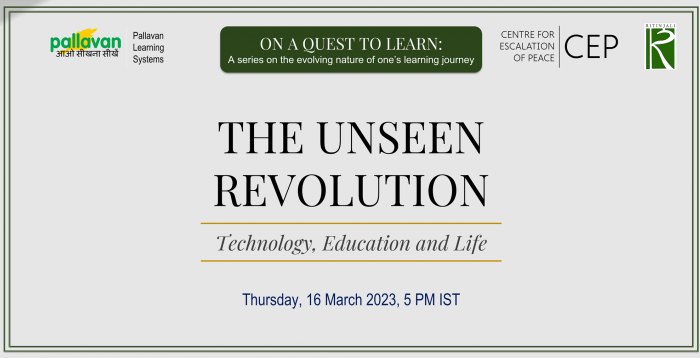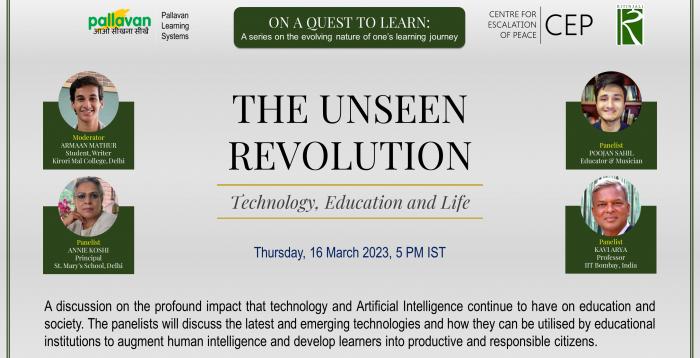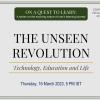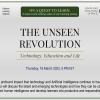THE UNSEEN REVOLUTION: Technology, Education and Life
Thursday, 16 March 2023, 5 PM IST
On the 16th of March 2022, Pallavan Learning Systems, in collaboration with the Centre for Escalation of Peace and Ritinjali organised their 10th webinar on the topic ‘The Unseen Revolution: Technology, Education and Life’. The webinar was a part of the series ‘On a Quest to Learn: A series on the evolving nature of one’s learning journey’, and was geared towards having an informed discussion on the profound impact that technology and Artificial Intelligence continue to have on education and society. More than 100 participants from various countries, including Australia, Bangladesh, Bhutan, Cabo Verde, India, Nepal, Russia, the UK, and the USA, attended the webinar. The audience had a diverse range of occupations, such as students, teachers, principals, parents, educators, researchers, founders, counselors, professors, doctors, influencers, entrepreneurs, psychotherapists, special educators, and curriculum developers.
Poojan Sahil, who is an educator and musician, gave the opening and closing remarks in addition to being one of the panellists. Armaan Mathur, who is currently pursuing Political Science Honours from Kirori Mal College, Delhi University, was the moderator for the webinar. The other esteemed panellists were Dr. Kavi Arya, professor, Indian Institute of Technology, Bombay, and Dr. Annie Koshi, Principal, St. Mary’s school in New Delhi.
The webinar started with a basic introduction to the latest advancement in technology, such as ‘ChatGPT’ and ‘Dall-E’. The question posed to the panellists was whether or not we have opened a pandora’s box and how we can prepare learners for this unseen revolution, both inside and outside educational institutions. The discussion that followed examined the fact that a technological revolution has in fact been underway since the industrial revolution, and these digital advancements exist on a continuum. Historically, every advancement has led society to question its impact on young people, including radio, television, calculators and so on. From that perspective, the discourse on how society will use technology has a long history.
This resulted in a deeper discussion on the entanglement between questions of ethics and morality on the one hand and technological advances on the other. While it was argued that despite many technological advances, the problems of poverty and suffering remain rampant, the counter argument was that technology is inherently neither good nor bad. Technology is simply just a tool in the hands of the wielder. How we decide to use these tools remains up to us, thus making what we teach young learners exceedingly important. The concepts of citizenship, responsibility and accountability were examined, with panellists agreeing that critical thinking and the ability to ask the right questions will increasingly become the most important thing to teach in education institutions.
The panellists discussed the fact that the latest advancement in digital technology and artificial intelligence will change the nature of the classroom, in which the simple transfer of knowledge and facts will no longer be relevant. Similarly, these advancements will increasingly take over jobs that require high level of automation. What cannot be replaced is the ability to be creative and to think innovatively to response to challenges faced by society and the planet. That is why the role of educators remains ever important. Helping learners how to think, how to create and innovate, how to ask the right questions, and how to always continue learning and become persons of substance – will remain the purpose of education.
To read the full report, please click here. You can also watch the full webinar video at this link.
MODERATOR AND PANELISTS
Introduction & Closing: POOJAN SAHIL
Poojan is an educator who specializes in Mathematics and is also a musician. He often integrates technology into both his personal and professional pursuits. Furthermore, he has written several articles on education, art, and technology, which have been featured in various news publications.
Moderator: ARMAAN MATHUR
Armaan is currently pursuing Political Science Honours at Kirori Mal College, Delhi University. He has been an avid reader and writer since his school years, starting with the student edition of Hindustan Times. Over time, he has written on diverse topics such as India's domestic politics, constitutional law, US elections, US-China relations, federalism, and culture, which have been published on various websites including The Print, India Forum, and Freedom Gazette. Armaan's passions lie in the fields of history, political science, education, technology, and international relations.
Panelist: ANNIE KOSHI
Dr. Annie Koshi, the Principal of St. Mary's School, has completed her graduation and post-graduation in English (Hons) from Lady Sri Ram College, Delhi, and later earned a B.Ed. from CIE (Delhi) and an M.A. in Educational Management from Oxford Brookes, U.K. Dr. Koshi also received training in Testing and Evaluation as part of the CBSE ELT Project at the College of St. Mark and St. John, Plymouth, UK. She did her Ph.D. from Indian Institute of Technology (IIT) in New Delhi and is focused on the topic "The Discourse of Education: Re-Examining the concept of inclusion via a study of the narratives of school children and the Indian state".
Panelist: KAVI ARYA
Dr. Kavi Arya is a Professor of Computer Science & Engineering at the Indian Institute of Technology (Bombay). He holds a B.Sc. (Hons.) in Computing Science from Imperial College of Science & Technology (UK) and an M.Sc.(Hons.)/Ph.D. in Computation from the University of Oxford. During 1988-90, Dr. Arya worked with the Animation Workstations Group at IBM's T.J. Watson Research Labs (Yorktown Heights, NY/U.S.A.). Prior to joining IIT Bombay in 2000, he held various positions in the industry. Dr. Arya is a member of high-level Govt. committees on IT Advisory Boards in Industry and serves on the Governing Council and Academic councils of several universities.
To read the full report, please click here. You can also watch the full webinar video at this link.
To receive regular updates, subscribe to our Pallavan World and PLS Newsletter.
Should you have any feedback and suggestions, please feel free to share with us.




